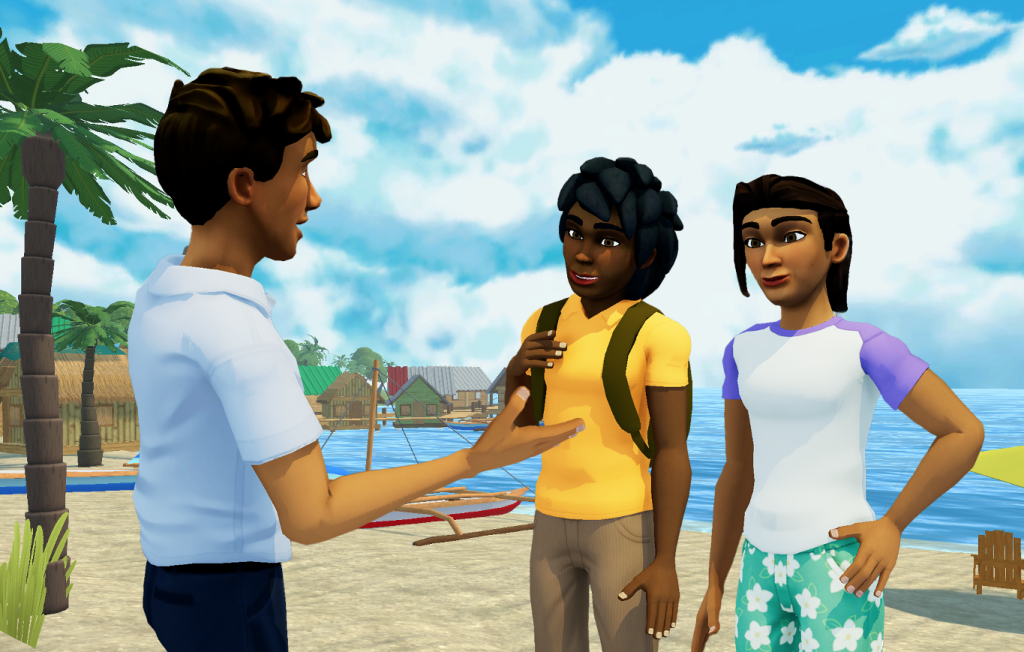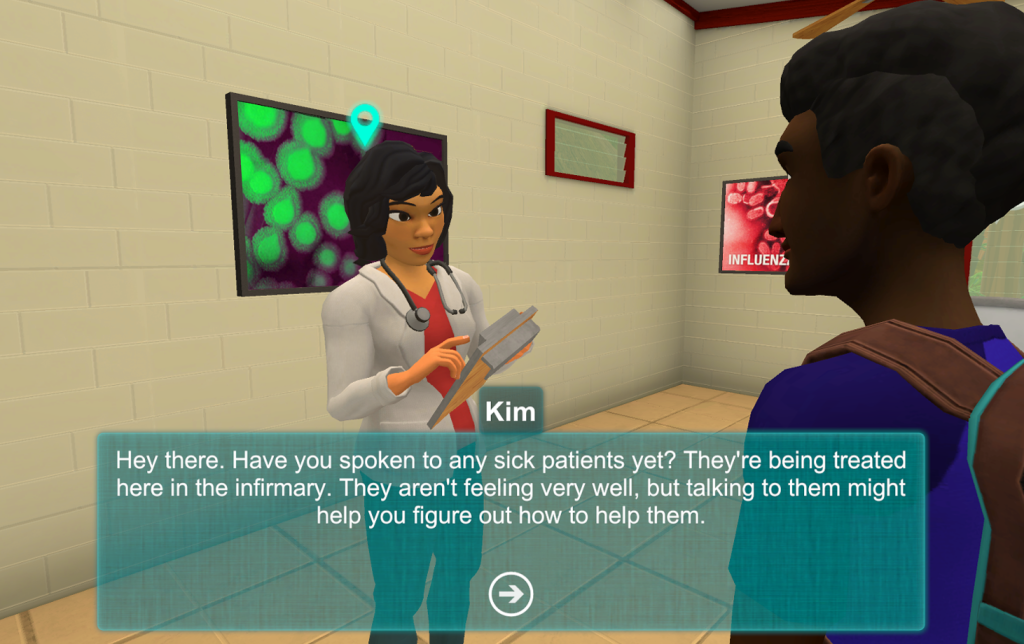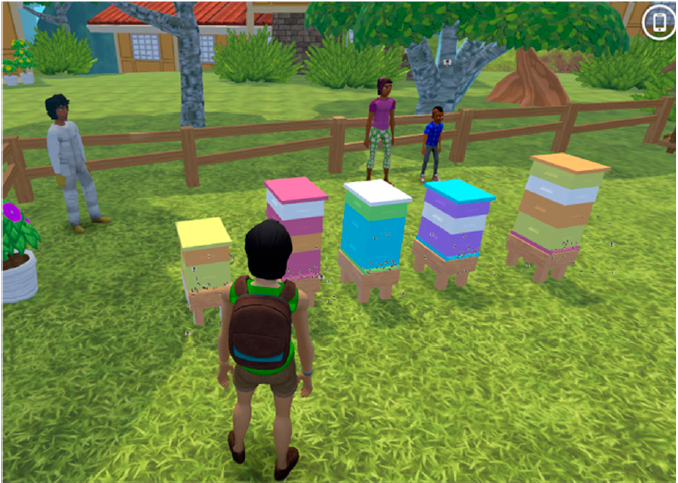Authors: Kara Cassell, Yeo Jin Kim, Dan Carpenter, Wookhee Min, and James Lester
Key Ideas
- AI-enabled narrative-centered learning environments engage middle school students in authentic, inquiry-driven science learning.
- Large language models can improve students’ learning experience by analyzing problem-solving interactions, group dialogue, and scientific argumentation and then providing timely and contextually-relevant adaptive narratives and scaffolding.
- Students explore real-world issues like disease outbreaks, ecosystem health, and food systems through interactive narrative-centered learning environments.
The National Science Foundation AI Institute for Engaged Learning (EngageAI) is advancing K-12 STEM education through the development of AI-enabled narrative-centered learning environments. These environments leverage artificial intelligence (AI) technologies for adaptive narrative planning and collaborative problem-solving support by creating engaging, inquiry-based science learning experiences for middle school students.
Our AI research focuses on natural language processing and machine learning to support real-time analysis of student engagement, dialogue, and scientific reasoning to enhance science, technology, engineering, and math (STEM) skills. Below, we highlight three AI-enabled narrative-centered learning environments that support middle school students in exploring real-world science problems through adaptive, story-based experiences enhanced by AI: EcoJourneys, Crystal Island, and SciStory: Pollinators.
EcoJourneys: An AI-Enabled, Collaborative Narrative-Centered Learning Environment for Middle Grades Ecosystems

EcoJourneys, an AI-enabled, collaborative narrative-centered learning environment focused on ecological health and community dynamics, features a virtual island with an economy and culture heavily reliant on tilapia. When a mysterious illness begins affecting the fish population, students must work collaboratively to identify the cause.
The environment supports multiple modes of peer interaction, including an in-game chat system, an embedded assessment tool for collaborative scientific argumentation, and a shared whiteboard. Students can use these tools to exchange data, develop hypotheses, and coordinate their investigative efforts.
Built in Unity and accessible via web browser, EcoJourneys is designed to promote systems thinking and collaborative scientific reasoning in an authentic problem-solving context.
Students’ collaborative problem solving is evaluated and supported by a large language model that operates in two key areas. One area focuses on guiding the collaboration process by analyzing student dialogue and providing group-level scaffolding. The other assesses the group’s submitted natural language responses to scientific argumentation questions and evaluates students’ arguments based on accuracy, use of scientific concepts, relevance of evidence, and how they provide adaptive feedback accordingly.
Crystal Island: An AI-Enabled Narrative-Centered Learning Environment for Middle Grades Microbiology

Crystal Island is an AI-driven, narrative-centered learning environment designed to support middle school science education. In this interactive experience, students portray Epidemic Intelligence Service agents tasked with identifying the cause of an outbreak affecting researchers on a remote island.
Through dialogue with non-player characters (NPCs), the collection and analysis of environmental samples, and the completion of a diagnostic worksheet, students engage in scientific inquiry and evidence-based reasoning.
Developed using the Unity game engine and deployed via web browser, Crystal Island integrates core microbiology content with an engaging narrative to foster problem solving and critical thinking skills.
As students interact with the learning environment, AI-driven narrative planning technologies operate in the background to automatically adapt the narrative each student experiences to best support their learning, problem solving, and engagement. Crystal Island dynamically modifies character dialogue to provide students with suggestions for learning content and problem-solving activities based on their current progress. NPCs may move to different virtual locations to draw students’ attention to the information that they have to offer, pose science questions to assess students’ understanding of important topics, or present new science content to support students’ investigation.
SciStory: Pollinators: An AI-Enabled, Collaborative Narrative-Centered Learning Environment for Middle Grades Food Systems and Sustainability
SciStory: Pollinators is an AI-enabled narrative-centered learning environment that introduces students to the complex interconnections among food production, pollinator health, and environmental sustainability.
Students act as advisors to a local mayor and must help a community make an informed decision about whether to transform a vacant urban lot into a community garden or a parking facility. By interviewing residents, consulting with experts, and visiting a local apiary, students gather data to inform their recommendations.
Developed in Unity as a collaborative 3D learning environment and complemented by a more scalable single-player version built in Ren’Py, SciStory: Pollinators supports civic engagement and interdisciplinary learning through inquiry-driven narrative.
Within the narrative-centered learning environment, certain NPCs function as large language model-powered conversational agents, enabling students to engage using natural language. The agents respond to open-ended questions related to domain content or narrative progression in real time, using retrieval-augmented generation techniques that reference an external knowledge base. In addition to providing informational support, the agents also serve an evaluative role by analyzing students’ written arguments based on predefined rubrics and delivering diagnostic feedback along with targeted suggestions for improvement.
Next Steps for AI-Enabled Narrative-Centered Learning Environments
All three learning environments have gone through several rounds of classroom-based implementations to test their efficacy and are still being developed and updated to incorporate changes based on findings from these studies.
EcoJourneys’ development is currently focused on improving multiplayer capabilities while incorporating more narrative planning techniques for collaborative situations. Crystal Island’s work focuses on adding and improving all of the narrative planning functionalities, including modifying the story and story world based on player activities. Finally, SciStory: Pollinators’ work continues to expand the narrative, integrate with other classroom tools, and add features such as spoken conversational agent interactions.
Work will continue through the final year of the EngageAI Institute’s funding.

